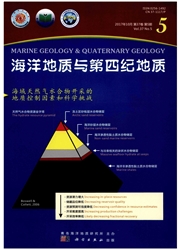

 中文摘要:
中文摘要:
根据东海陆架Zk23孔岩心分析资料,进行了沉积地层学、生物地层学和年代地层学分析,确定了该钻孔中段细砂层为埋藏古长江河口沙脊沉积,阐明了该孔附近海区冰消期前后和冰后期的沉积历史。约15kaBP以前,海平面上升较快,沉积了下层的河口-水下三角洲相地层;15~12kaBP的冰消期期间,海平面波动并稳定于60-80m等深线附近,发育了沙脊地貌;12kaBP以来海平面再度快速上升,至7kaBP水位稳定,直至今日,沉积了沙脊上覆的浅海相粉砂质黏土和黏土质粉砂地层。
 英文摘要:
英文摘要:
Based on the analysis of core samples from the hole of Zk23 in the East China Sea Continental Shelf and by means of sedimentary stratigraphy, biostratigraphy and chronostratigraphy, the authors consider that the fine-sand deposition in borehole was part of buried ancient estuary sand ridges of the Yangtze River. The deposition history of study area around the hole before and after the glacial period as well as postglacial period is made clear after our research:(1)the estuarine sublayer-undersea delta facies was deposited during the fast sea level rise around 15 kaBP; (2)sand ridges mostly consisting of fine sand, were formed when the sea level was the fluctuation range of 60-80 m of isobath during the deglacial period around 15-12 kaBP;(3)first silty clay and clay silt strata above the sand ridges were deposited during the period when the sea level rose fast from 12 to 7 kaBP and then it keeps stable to the present.
 同期刊论文项目
同期刊论文项目
 同项目期刊论文
同项目期刊论文
 期刊信息
期刊信息
